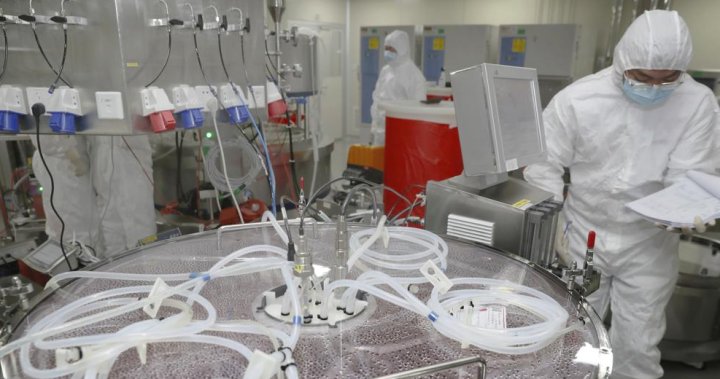In what looks to be a first for the entire world, the Chinese city of Shanghai began dispensing an inhalable COVID-19 vaccination on Wednesday.
According to a posting on an official city social media account, the free booster dose of the vaccine, a mist that is breathed in via the lips, is being made available to those who have already had vaccinations.
Because they are simpler to deliver, such “needle-free” vaccines are expected to increase vaccination rates in nations with weak health systems. They might also convince those who dislike getting injected in the arm to have an immunisation.
China wants more people to get booster shots before it relaxes strict pandemic restrictions that are holding back the economy and are increasingly out of sync with the rest of the world.
90% of Chinese people had completed their vaccinations as of mid-October, and 57% had had a booster dose.
People at a community health centre were seen in a video broadcast online by a Chinese state-run media source inserting the short nozzle of a translucent white cup into their mouths. According to the text that accompanied the image, people hold their breath for five seconds after slowly breathing, and the total process takes 20 seconds.
One Shanghai resident can be heard in the film saying, “It was like sipping a cup of milk tea.” It tasted a little bit sweet when I took a whiff of it.
Non-needle vaccines’ efficacy hasn’t been thoroughly studied. Chinese regulators approved the inhalable one in September, but only as a booster shot after studies showed it triggered an immune system response in people who had previously received two shots of a different Chinese vaccine.
One specialist claimed that, depending on the size of the droplets, an oral vaccine could be able to stop the virus before it spreads to the rest of the respiratory system.
According to Dr. Vineeta Bal, an immunologist from India, larger droplets would train defences in areas of the mouth and neck while tiny ones would penetrate further into the body.
CanSino Biologics Inc., a Chinese biopharmaceutical business, created the inhalable vaccination.
as an aerosol variation of the business’s one-shot adenovirus vaccine, which makes use of an essentially risk-free cold virus.
More than ten markets, including China, Hungary, Pakistan, Malaysia, Argentina, and Mexico, have approved the use of the conventional one-shot vaccine. According to a Malaysian media story from last month, the inhaled version has been given the green light for clinical trials in that country.
A needle-free nasal vaccine has been approved by Indian regulators, but it has not yet been distributed.
The American-developed vaccine is administered through nasal spray by Indian vaccine manufacturer Bharat Biotech.
According to the World Health Organization, about a dozen nasal vaccinations are now undergoing testing worldwide.
China has mostly used two inactivated vaccines that were created locally. These vaccines have shown promise in reducing mortality and major illness, but they have lagged behind the Pfizer and Moderna vaccines in terms of halting the spread of the disease.
Chinese authorities similarly do not demand vaccination; rather, a negative COVID-19 test is required for entry into office buildings and other public locations, not vaccination documentation. In addition, compared to other countries, only a small part of the population has been exposed to the disease and developed immunity this way in the country due to its rigorous “zero-COVID” policy.
The extent to which COVID-19 might spread if limitations were eased is therefore unknown.
The “zero-COVID” policy, which the ruling Communist Party has so far showed no signs of relaxing, has seen swift travel restrictions and lockdowns implemented whenever even a small number of cases are found.
The virus was originally discovered in Wuhan in late 2019; authorities on Wednesday ordered a five-day lockdown of the city’s 900,000 residents. The metropolitan areas of Xining city in the isolated Qinghai province have been secured since last Friday.
In Beijing, Universal Studios said it would close its hotels and attractions “to comply with pandemic prevention and control. ” In the most recent 24-hour period, the city of more than 21 million people recorded 19 new cases.
China is releasing inhalable, needle-free vaccination for COVID-19


uwGHYQghVySRfAJ
CXGqrMtZmwca